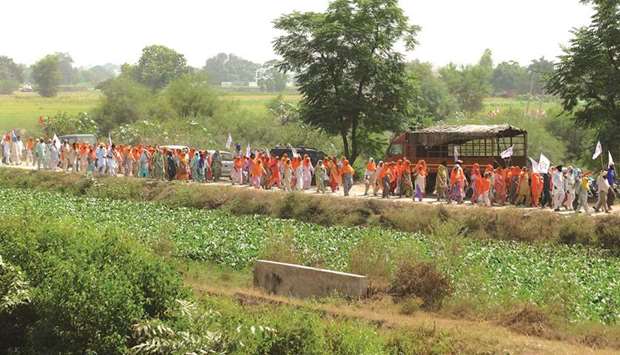President Ram Nath Kovind yesterday approved three controversial agricultural bills amid nationwide protests by farmers who say the new laws will stunt their bargaining power and instead allow large retailers to have control over pricing.
Farmers’ organisations say one of the three laws could lead to the government stopping buying grain at guaranteed prices, a move that would disrupt wholesale markets which have so far ensured fair and timely payments to farmers.
Kovind’s approval is likely to further stir protests, leading farmers’ organisations said.
Prime Minister Narendra Modi has already lost Akali Dl party, a key political ally from Punjab, one of India’s two bread basket states, where farmers form an influential voting bloc.
The country’s main opposition Congress party has also backed the protests.
Under the Farmers’ Produce Trade and Commerce (Promotion and Facilitation) Bill – one of the laws already approved by parliament – growers can directly sell their produce to institutional buyers such as big traders and retailers.
Nearly 85% of India’s poor farmers own less than 5 acres of land and they find it difficult to directly negotiate with large buyers.
Modi’s administration has clarified that the wholesale markets will operate as usual, and the government only aims to empower farmers to sell directly to buyers.
The prime minister yesterday said farmers had benefited after fruits and vegetables were taken off the ambit of the Agriculture Produce Marketing Committee Act in 2014 and now other growers would benefit too.
They would be able to send their produce wherever they want and also get a good price, Modi said.
Meanwhile, Akali Dal president Sukhbir Badal described the presidential assent to the farm bills as “sad, disappointing and extremely unfortunate”.
In a statement here, Bada said it was really a “dark day for the country” that the president had refused to act as per the nation’s conscience.
“We were very hopeful that the honourable president would return these bills to the parliament for reconsideration as demanded by our party and by some other opposition parties too,” he said.
Akali Dal Lok Sabha MP and Badal’s wife Harsimrat Kaur Badal resigned from Modi’s cabinet on September 17, citing her party’s opposition to the three bills.
In a related development, Maharashtra’s ruling Maha Vikas Aghadi (MVA) allies, the Shiv Sena and the Nationalist Congress Party, welcomed the Akali Dal’s decision to quit the Bharatiya Janata Party-led National Democratic Alliance.
Akali Dal is the second party – and among the oldest allies – after the Shiv Sena, to have broken ties with the BJP in the past one year.
“Both parties (Shiv Sena and Akali Dal) stood by the BJP through thick and thin, while others have joined when they smelt power. Shiv Sena was forced to quit the NDA last year while Akali Dal has quit over the farm bills. We felt sad over the development,” Shiv Sena spokesman Sanjay Raut said.
NCP president Sharad Pawar said “congratulations” to Sukhbir Singh Badal, who under the leadership of his father Parkash Singh Badal, pulled out of the NDA.
He also lauded Harsimrat Kaur for leaving the NDA to protest against the bills.

Farmers shout slogans as they arrive to block railway tracks during a protest against the central government following the passing of new farm bills, on the outskirts of Amritsar in Punjab yesterday.
